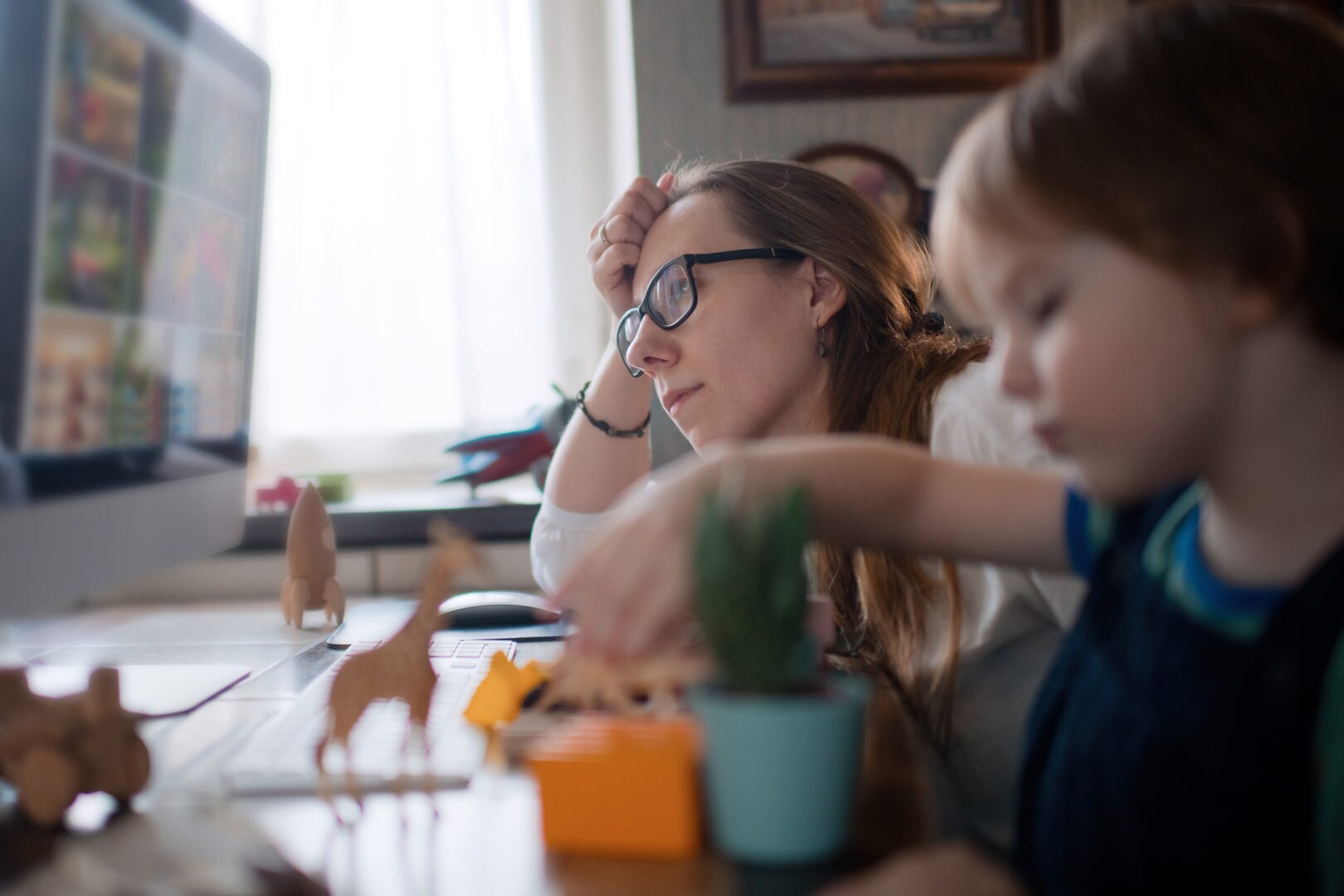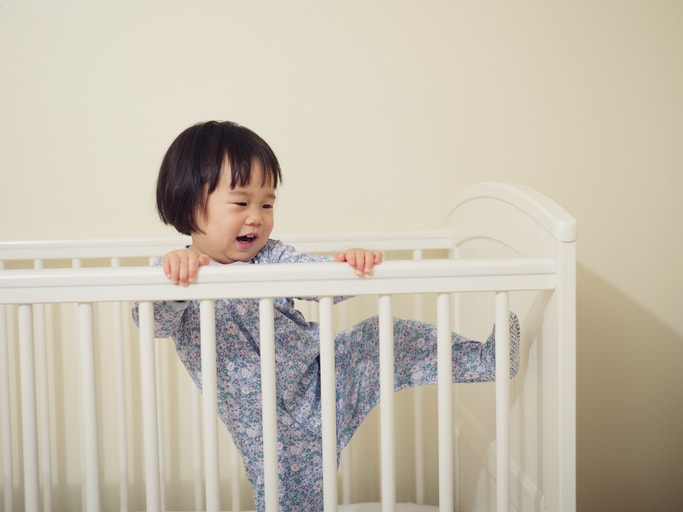“What’s wrong?” I text my mom friend after she abruptly cancels our weekly walk. “Everything and nothing,” she replies. I get it. Any mom would get it under normal circumstances when we weren’t parenting during a pandemic — but now? An explanation for “everything and nothing” would just be belaboring the point. “Everything and nothing” has become the unofficial, unwelcome background din of parents’ lives this past year. Put simpler: The pandemic has kicked our butts.
When it comes to moms, feeling burnt out is nothing new. “Research on parental burnout, even pre-pandemic, suggests that moms are more prone to it,” says Dr. Juli Fraga, a psychologist specializing in prenatal and postpartum depression, “most likely because they take on much of the childrearing and household responsibilities, in addition to their work responsibilities.”
Back in the halcyon days of 2019, a labor study found that full-time working women spent seven more hours per week on housework compared to their male colleagues. The 2020 findings were far more grim, with 1 in 3 working moms considering downshifting their work or leaving the workforce altogether in order to care for their children and homes. (“How come I’m the only one thinking about this and my husband isn’t?” one mom involved in the study wondered.)
Spent, depleted, done — however you want to put it, odds are you’ve felt it in an accelerated way at some point in the last year. Here, experts weigh in on how the pandemic has exacerbated parental burnout, and mom burnout especially, and more importantly, how exhausted parents, and exhausted moms especially, can lighten the load and even recharge right now.
What is burnout?
Burnout is a “feeling of utter exhaustion that affects one’s physical and emotional health,” according to Fraga. There are different types of burnout — job burnout (the only one the World Health Organization includes in their International Classification of Diseases), caregiver burnout and parental burnout are a few. With all types, though, the general cause is excessive and prolonged stress.
What are the signs of parental burnout?
Frustratingly, burnout is sometimes hard to pinpoint (hence, “everything and nothing”). However, according to Fraga, signs of parental burnout may include the following symptoms:
-
Forgetfulness.
-
Tearfulness.
-
Irritability.
-
Escape fantasies.
-
Resentment.
-
Feeling “too busy” for self-care.
“For some people, burnout can feel like a constant, dull ache of fatigue,” says Ruthie Arbit, a psychotherapist who specializes in maternal and pediatric mental health. “Like a pebble stuck in your shoe that is slightly bothersome every time you take a step,” adds Arbit. “It can also mimic signs of mild depression, like anhedonia or lack of enjoyment for things.”
In a 2019 New York Times piece on parental burnout, journalist Jessica Grose reported the following as the biggest contributors:
-
Being a woman.
-
Working part-time or not at all.
-
Having a college degree.
-
Having an inflexible workplace.
Needless to say, the odds aren’t exactly in moms’ favor.
How the mental load of motherhood contributes to burnout
A more direct contributing factor to burnout is the mental load many moms bear, or, as some refer to it, the emotional labor. “Having to be the CEO of the household and mentally prepare for every little thing that needs to get done, like grocery shopping, cleaning, helping kids resolve conflicts, making doctor appointments, etc. — that’s the mental load,” Fraga explains. “Having to be the thinker, the initiator and the one who keeps little details in mind and takes action can be tiring. Partners may say, ‘Just tell me what to do and I’ll do it,’ but what burned out parents want is for their partner to take initiative so they don’t have to.”
In other words: Delegating can relieve some of the physical tasks of parenting, but not the mental ones.
Not surprisingly, the mental load has morphed into an even more taxing job due to the pandemic. “Pandemic burnout is likely a combo of physical exhaustion, mental load and workload, all wrapped into one,” Arbit says. “Moms aren’t just remembering the doctor’s appointments, they’re thinking about the clean masks, the extra Lysol, all while worrying about academic and social success.”
How the pandemic is exacerbating mom burnout
By no stretch of the imagination have moms been the only ones extra stressed during the last year. From frontline workers and teens to older Americans, everyone has their brand of COVID-related stress. But when the pandemic was sprinkled atop the already-unequal division of labor at home, moms got clobbered.
“Current research and polling around the pandemic has revealed that moms are shouldering a lion’s share of the burden as it relates to managing children, online schooling and managing the home,” Arbit explains. “Many women have left the workforce, and those that are in the workforce continue to struggle to meet the demands of work and family. Due to these significant cultural and employment shifts, there is a corresponding emotional toll and burnout.”
Black, Latinx and Indigenous mothers, not surprisingly, have been among the hardest hit, according to the Center for American Progress. “Feeling the multiple effects of being more likely to have lost their jobs, being on the front lines as essential workers and solving their child care challenges on their own, the pandemic has made already-difficult situations even worse,” a 2020 report states, adding that, while white and wealthier women have left the workforce the past year (willingly or not), “women of color and low-paid women are more likely to make changes to their work schedules and rely on other child care solutions, as they have long done.”
Another parenting group hit extra hard: Single moms. “Even pre-pandemic, single moms were faced with unquestionable hardship across many different domains,” Arbit says. “This is likely due to juggling so many things and having less opportunity to voice their difficulties. Because of the latter, the mental health and emotional needs of single moms — including those caused by burnout — often go unnoticed and unmanaged.”
The root cause of the burnout moms are facing right now is a combination of things, part of a largely broken system overall. However, the confluence of taking on unprecedented responsibilities, such as creating at-home learning spaces, worrying how Zoom playdates are affecting kids’ social skills and having less child care than ever before (but, for many, not less work) has taken a crushing toll.
“I’m completely spent,” a friend told me recently. “I just can’t make my kids another hot lunch in the middle of my work day. Tomorrow I’m giving them popcorn.”
Tips for combating pandemic parenting burnout
Parenting burnout is hitting many of us really hard right now. Here are 10 ways to help alleviate it.
1. Lower your expectations. “Think about your list of negotiables and nonnegotiables,” Arbit says. “Maybe you’re eating more cereal for dinner, exercising less and only reading People magazine. That’s OK! Our pre-pandemic expectations of ourselves and our families should not be the same expectations we have now. Lower those expectations, and then look at your lowered expectations list and lower it again.”
2. Have self-compassion. “This is a critical but elusive strategy,” Arbit notes. “The self-compassion voice should be saying: ‘Yes, this absolutely sucks. This is not OK, and we can say it’s not OK.’ It’s so important to be gentle and understanding with ourselves right now. We were not meant to live like this. Giving yourself permission and space for these feelings can help with burnout.”
3. Try to stop doing everything. Similar, but more perhaps actionable than lowering expectations, is to stop doing it all, plain and simple, and find ways to share the parenting load. “Perhaps your partner is used to the family dynamics and knows you’ll take care of things,” Fraga says. “If you didn’t take care of every little thing, would they do more? And if your kids are older, can they help with household chores, too?”
One thing that’s helped alleviate my workload at home is having a list of nonnegotiable chores my husband and me split. In the morning, he unloads the dishwasher and makes breakfast; I pack the snacks and backpacks and clean up. The kids make their beds. No debating it, no hoping someone else takes care of an unwanted task. At night, we have a similar routine, so everyone knows what they’re handling, and it’s one less thing to think about.
4. Embrace the silly. Laughter and play reduce stress and increase endorphins — so more of that, please. “Being silly provides our bodies and minds with a release,” explains early childhood educator and content architect for KinderCare Education, Rashelle Chase. “It’s also a great way to connect with our kids. Goof around, tell jokes, make Tik-Tok videos — these things will both enhance the parent-child bond and help kids feel connected, safe and less stressed themselves.”
5. Stop multitasking. Moms may be master multitaskers, but that’s not necessarily a good thing. Research has shown that doing too many things at once — i.e., making dinner while looking through school papers while mentally planning playdates — contributes to less production, not more. Also, as most moms will attest to, it makes you feel a little twitchy.
6. Get out. There may not be a ton of places to go right now, but still, get out of your house — daily, if possible. “I take a walk every day — I have to,” says Andrea Simmons, a mom of three in Winfield, Illinois. “Ideally, I meet a friend and we walk for a half hour, but when that doesn’t happen, I’ll just take a few laps around the block to remove myself from the craziness at home. When I come back, I always have a much calmer attitude and outlook.”
7. Wake up first. “I’m really not a morning person, but the past few months I’ve tried to make it a point to be the first one up in the house,” says Meaghan Gopnik, a mom of two in New York City. “It’s the only time of the day where the house is totally quiet and peaceful, so it helps set the tone for the day.”
8. Practice gratitude. “Looking for the bright spots and expressing gratitude is good for not just your mental health, but also your physical health and relationships,” Chase says. “Whether it’s writing in a journal or sharing three good things that happened in your day at the dinner table, taking the time to feel and express gratitude can help get us through tough times.”
9. Find support. “While self-care is important, it’s still something you have to do for yourself,” Fraga says. And in times like these, having one more thing to do feels like the straw that may break the camel’s back. Something that may alleviate pressure when you’re “should-ing” all over yourself: Support. “It’s crucial for moms to have support and a community that cares for them,” notes Fraga.
Whether you have a standing walking date with friends, where you can vent and feel validated (which, arguably, is more revitalizing than a hot bath) or a parenting community you can turn to when you need to pour your heart out now (Mocha Moms and Moms Club are two reputable ones), it’s critical you don’t feel alone in your struggles.
10. Speak to a therapist. “Burnout can be a lot of different things for a lot of different people,” Arbit says. “For some, it may manifest as difficulty concentrating, restlessness, difficulty sleeping, irritability or a lack of motivation. For others, it can feel more serious. If you feel like your symptoms are significant, speak to a mental health professional, who can help you work through things.”



